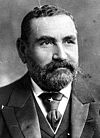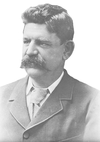1901 New South Wales state election
| |||||||||||||||||||||||||||||||||||||||||||||
All 125 seats in the New South Wales Legislative Assembly 63 Assembly seats were needed for a majority | |||||||||||||||||||||||||||||||||||||||||||||
|---|---|---|---|---|---|---|---|---|---|---|---|---|---|---|---|---|---|---|---|---|---|---|---|---|---|---|---|---|---|---|---|---|---|---|---|---|---|---|---|---|---|---|---|---|---|
| |||||||||||||||||||||||||||||||||||||||||||||
 Results of the election, showing the winning vote share of the elected member. | |||||||||||||||||||||||||||||||||||||||||||||
| |||||||||||||||||||||||||||||||||||||||||||||
The 1901 New South Wales state election was held on 3 July 1901 for all of the 125 seats in the 19th New South Wales Legislative Assembly and it was conducted in single-member constituencies with a first past the post voting system. The Parliamentary Electorates Act of 1893 had conferred the right to vote on every male British subject over 21 years of age who was resident in New South Wales for a year or more. The 19th parliament of New South Wales was dissolved on 11 June 1901 by the Governor, Lord Beauchamp, on the advice of the Premier, John See.
Federation had seen a re-evaluation of priorities among the main political parties in New South Wales, with the Protectionist Party and the Free Trade Party becoming the Progressive Party and the Liberal Reform Party respectively.
Key dates
[edit]| Date | Event |
|---|---|
| 11 June 1901 | The Legislative Assembly was dissolved, and writs were issued by the Governor to proceed with an election. |
| 22 June 1901 | Nominations for candidates for the election closed at noon. |
| 3 July 1901 | Polling day. |
| 23 July 1901 | Opening of 19th Parliament. |
Results
[edit]|
New South Wales state election, 3 July 1901 [1] | ||||||
|---|---|---|---|---|---|---|
| Enrolled voters | 345,500 | |||||
| Votes cast | 194,980 | Turnout | 62.84 | +2.23 | ||
| Informal votes | 1,534 | Informal | 0.78 | −0.14 | ||
| Summary of votes by party | ||||||
| Party | Primary votes | % | Swing | Seats | Change | |
| Liberal Reform | 65,420 | 33.55 | +0.66 | 37 | −8 | |
| Progressive | 44,817 | 22.99 | −20.04 | 42 | −10 | |
| Labour | 35,952 | 18.44 | +6.26 | 24 | +5 | |
| Independent | 21,595 | 11.08 | +8.09 | 12 | +8 | |
| Independent Liberal | 16,770 | 8.60 | +6.72 | 4 | +3 | |
| Ind. Progressive | 6,533 | 3.35 | −3.68 | 2 | −2 | |
| Independent Labor | 3,565 | 1.83 | +1.82 | 4 | +4 | |
| Socialist Labor | 328 | 0.17 | +0.17 | 0 | ±0 | |
| Total | 194,980 | 125 | ||||
Retiring members
[edit]Progressive
[edit]- Joseph Abbott MLA (Wentworth)
- John Chanter MLA (Deniliquin) — elected to the federal House of Representatives
- Austin Chapman MLA (Braidwood) — elected to the federal House of Representatives
- Francis Clarke MLA (Hastings and Macleay) — elected to the federal House of Representatives
- George Cruickshank MLA (Inverell) — elected to the federal House of Representatives
- Thomas Ewing MLA (Lismore) — elected to the federal House of Representatives
- Thomas Goodwin MLA (Gunnedah)
- Thomas Hassall MLA (Moree)
- William Sawers MLA (Tamworth) — elected to the federal House of Representatives
- Dugald Thomson MLA (Warringah) — elected to the federal House of Representatives.[a]
Liberal
[edit]- Joseph Cook MLA (Hartley) — elected to the federal House of Representatives
- Francis Cotton MLA (Newtown-Camperdown)
- Sir Matthew Harris MLA (Sydney-Denison)
- Francis McLean MLA (Marrickville) — elected to the federal House of Representatives
- John Neild MLA (Paddington) — elected to the federal Senate
- George Reid MLA (Sydney-King) — elected to the federal House of Representatives
- Bill Wilks MLA (Balmain North) — elected to the federal House of Representatives
Labor
[edit]- Thomas Brown MLA (Condoublin) — elected to the federal House of Representatives
- Billy Hughes MLA (Sydney-King) — elected to the federal House of Representatives
- William Spence MLA (Cobar) — elected to the federal House of Representatives
- Josiah Thomas MLA (Alma) — elected to the federal House of Representatives
- James Thomson MLA (Newcastle West)
- David Watkins MLA (Wallsend) — elected to the federal House of Representatives
- Chris Watson MLA (Young) — elected to the federal House of Representatives
Independent
[edit]- John McLaughlin MLA (Raleigh)
Changing seats
[edit]Notes
[edit]- ^ Dugald Thomson had been elected as member of the Progressive party in 1898, then known as the National Federal party, described as a free trade federationist.[2]
- ^ Compares members at the 1898 election and the 1901 election and does not include the seats of Canterbury where the seat was won by an independent at a by-election but was regained by the Liberal Reform Party at the 1901 election.
- ^ a b c d e f g h i Elected to the federal parliament.
- ^ Kenneth Mackay was appointed to the Legislative Council and Niels Nielsen won the seat at the by-election.
- ^ a b c d e f g Did not contest the election.
- ^ Unsuccessfully contested Quirindi.
- ^ a b Richard Stevenson died in 1899 and John Norton won the seat in a by-election, retaining it uncontested at the 1901 election.
See also
[edit]- Candidates of the 1901 New South Wales state election
- Members of the New South Wales Legislative Assembly, 1901–1904
References
[edit]- ^ Green, Antony. "1901 Totals". New South Wales Election Results 1856-2007. Parliament of New South Wales. Retrieved 30 August 2019.
- ^ "Mr Dugald Thomson". The Australian Star. 16 July 1898. p. 9. Retrieved 1 April 2020 – via Trove.
- "Former members of the New South Wales Parliament, 1856-2006". New South Wales Parliament. Retrieved 8 July 2012.



